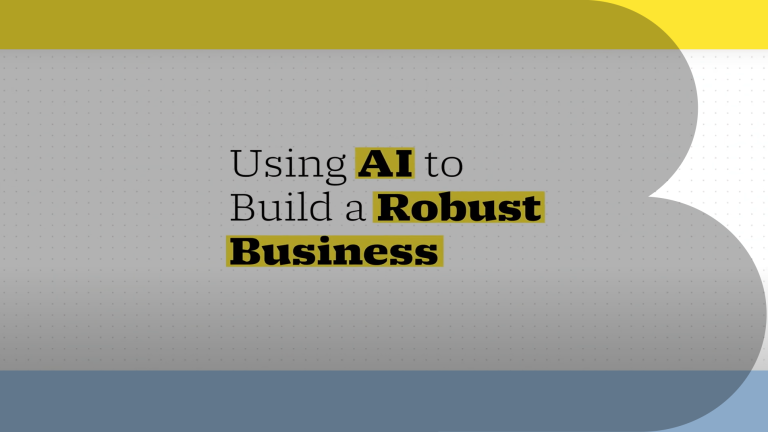How robust is your company?
![{[downloads[language].preview]}](https://www.rolandberger.com/publications/publication_image/TA31_Cover_EN_download_preview.jpg)
Think:Act Magazine explores how today’s companies can become robust and survive the coming decade through lessons in innovation, purpose and adaptation.



Harvard professor Karim Lakhani has one piece of advice for firms and their leaders: Roll out today’s AI tools now and use them to reinvent your business if you want to survive.

Reading just a few weeks' worth of headlines and corporate announcements involving artificial intelligence (AI) can induce something like a mild form of whiplash. Fast food giant McDonald's is planning to test kiosks at some of its US locations where customers can order by talking to a digital assistant. This experiment comes on the heels of the company's acquisition of a Silicon Valley natural language startup. Meanwhile, the convenience store brand 7-Eleven has opened its first cashier-less store in Dallas, Texas, letting customers roam the aisles and simply walk out with their wares. It's the same intelligent tech on the back end – mainly machine vision – that already powers a growing number of Amazon Go stores. Not to be outdone, Starbucks says it will have 4,000 AI-enabled robo-baristas in stores by the end of 2020 in order to automate and optimize what it's brewing and frothing.
And that's just the consumer-facing part of AI coming to a business near you. Behind the scenes at thousands of companies, big platforms such as Amazon, Google and Microsoft are providing the cloud-based computer power combined with analytics and decision-support capabilities to run digital businesses. After mastering this discipline in-house to attract and engage their customers, these platforms rent access to AI-powered systems to any organization to gather and analyze large amounts of data across their entire operations.
AI, in other words, is quickly and inevitably becoming the new engine of growth, according to Harvard Business School professors Marco Iansiti and Karim Lakhani. They lay out their case in their new book, Competing in the Age of AI, that businesses shouldn't engage in wishful thinking that powerful AI is years off into the future or relegated to dystopian sci-fi stories. Far from it, the two academics argue.
"Algorithms and data are now at the center of the company."
Change is happening here and now, driven by tools that are already available – and it will eat the incumbents' lunch. If leaders don't ready their organization for a sweeping transformation, that is. "AI is becoming the universal engine of execution," not only displacing human activity but "changing the very concept of the firm, how companies operate and compete," they write. Executives who embrace this momentous evolution into a "new economic age" can not only survive, but also unlock new areas of growth. And the end point, as Lakhani explains in a wide-ranging interview, is to become an "AI factory," where the core of the firm functions as a scalable decision factory fed by vast amounts of data.
He likes to think of this as the next logical step in industrialization, this time streamlining the gathering and analysis of data and automating the decision-making processes. "Software, data and AI power a new breed of organization. It's the first time in more than a century that a new kind of firm emerges," he says. "The employees don't deliver the product or services. They work at the edges to design and oversee a software-automated, algorithm-driven digital organization that actually delivers the goods."
There are plenty of current examples where companies have taken humans out of the loop and are betting big on merging data pipelines and letting machine learning make sense of things. "Algorithms and data are now at the center of the company instead of human processors who used to make decisions," Lakhani explains. "If you think about it that way, this newly emerging economy starts to make sense across many different industries, from advertising to ride-sharing and mobility to accommodations and entertainment. All of them have the same features built into them that let them scale in a way we haven't seen before. Those companies can easily expand their scope and have this very powerful learning engine or experimentation platform at their core." Taking this step does not require waiting for a technological breakthrough in AI. "Weak or narrow AI that's on the market today works just fine," the Harvard professor argues. "Each one of these algorithms is very narrowly constrained and defined. They do one thing and do it really well."
A firm may have a collection of algorithms that appear to give it some superpowers. "Task-specific algorithms become better over time as they get more and more data and as we fine-tune the parameters. But it's not as if a robot will come in and take over." He thinks the attention on general AI is overblown – and a distraction. "Managers will not be replaced by software or AI, but managers who don't augment themselves with AI will be replaced by managers who do."
Becoming an AI factory is a process that every company in every industry can pull off, Lakhani says. "No matter if you make burgers or cars, the AI factory is the same at all companies. It's a generic capability that all organizations will need to have if they want to take advantage of what's happening." Companies that rethink their business model and their entire operating model around digitization will come out ahead.
To arrive at their conclusions, the two Harvard professors analyzed the status quo at 350 firms and a total of 40 different business processes. They ended up focusing on organizations in the manufacturing and service sectors with a median size of 6,000 employees and $3.4 billion in revenues. Those that embraced data and analytics across engineering, manufacturing and operations instead of just running isolated pilots were able to realize substantial benefits.
Rethinking one's business model for this new world is not about products or services per se, the academic adds. "You have to think of your company in the sense of an abstraction: What is it that we're serving? Why do customers come to us? And what did we learn from those customers?" The whole thought experiment revolves around capturing, cleaning and using those data streams, which feed a virtuous cycle consisting of more data, better algorithms, better service, more usage and, eventually, even more data.
Apart from new software tools, competing in the age of AI also means acquiring and honing new skills as an executive. So far, Lakhani laments, leadership skills and thinking lag behind the technical capabilities. "We need new ethics and leadership wisdom. You can't defer this to the next generation of leaders. As a board and as managers, you have to take this on now."
It starts with learning the basics. Leaders should familiarize themselves with new tech skills like they used to do with accounting and finance, says the academic. "Learning about statistics, programming and machine learning will be equally important for executives. Not that you will become a Ph.D. data scientist. But you need to understand what these capabilities enable you to do and what their limitations are." Lakhani sees this new skill set as a precondition to master the art of managing a firm's networks and data flows.
Mental retooling needs to happen throughout the ranks. Royal Dutch Shell, for example, recently announced it is expanding an online program to teach AI skills. So far 2,000 of its 82,000 employees have expressed interest or have been approached to participate. The online courses are offered by learning platform Udacity, which has rolled out an "AI leadership program" targeted at executives who want to learn how to better communicate with their data scientists and understand potential use cases and problems. The latter is important since these novel digital operating models come with risks and responsibilities that go beyond managing change at one company. The ongoing debates around amplifying false or misleading information, algorithmic bias and cybersecurity are reminders of what is at stake.
As the dominant platforms Amazon, Google and Microsoft evolve into " digital superpowers, " Lakhani says, they create and control the connections in key networks that other firms are forced to use. Alphabet subsidiary YouTube, for instance, already makes more money from ads – a total of $15 billion in 2019 – than the traditional networks ABC, NBC and Fox combined. "These guys are already becoming utilities in the modern economy ," Lakhani says. "And when utilities emerge, there's regulation . So I wouldn't be surprised if these companies aren't regulated to some degree in Europe and the US." He is not concerned that a recession may throw a wrench in this big transformation. "If anything," he demurs, "there'll be more pressure to adopt AI because the efficiency gains are so much higher."

![{[downloads[language].preview]}](https://www.rolandberger.com/publications/publication_image/TA31_Cover_EN_download_preview.jpg)
Think:Act Magazine explores how today’s companies can become robust and survive the coming decade through lessons in innovation, purpose and adaptation.
Stay up to date on the latest global trends and developments in the business world. Subscribe to Roland Berger's Think:Act Magazine now and get access to this and upcoming editions as PDF, including articles by renowned authors and exclusive interviews with thought leaders.
